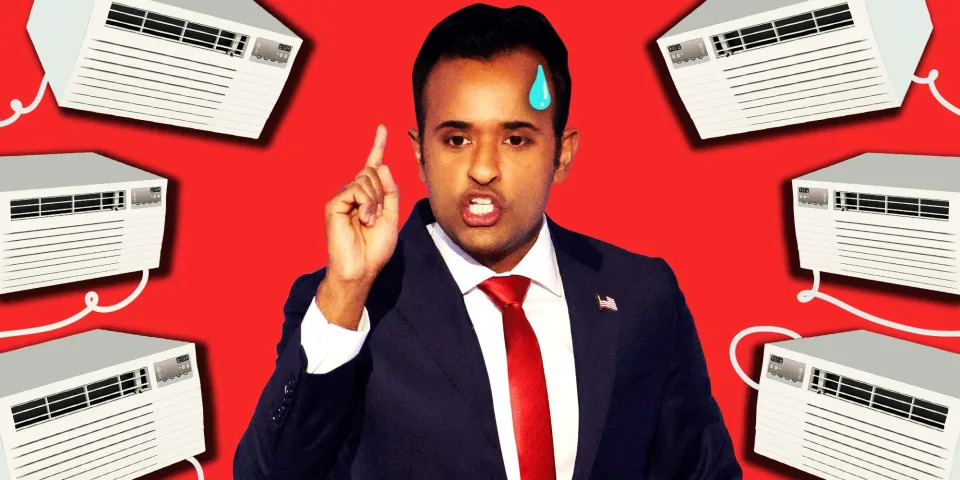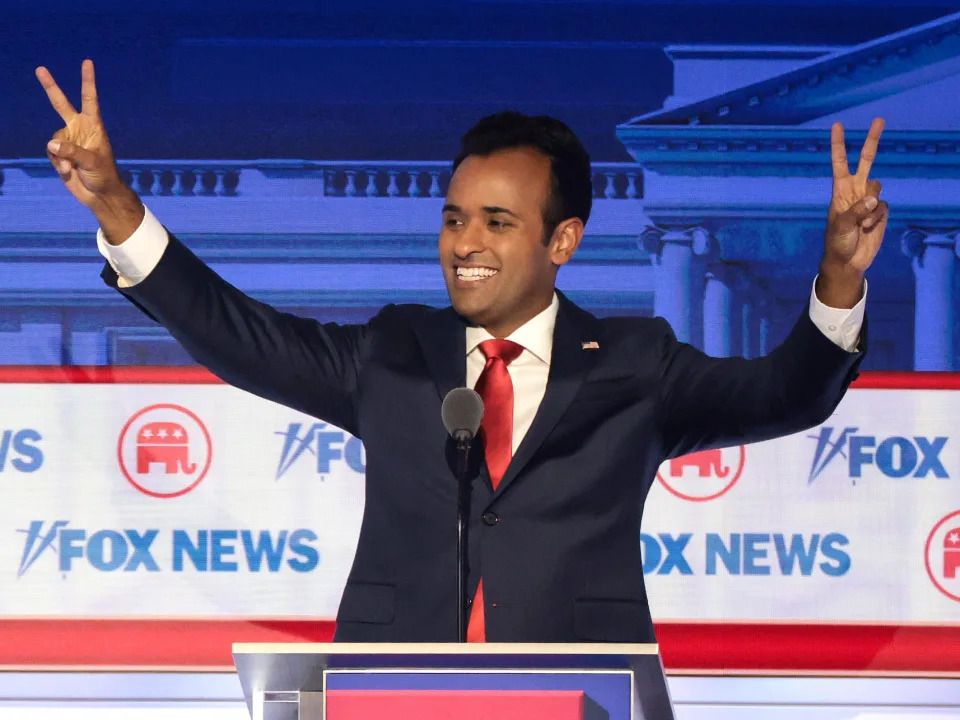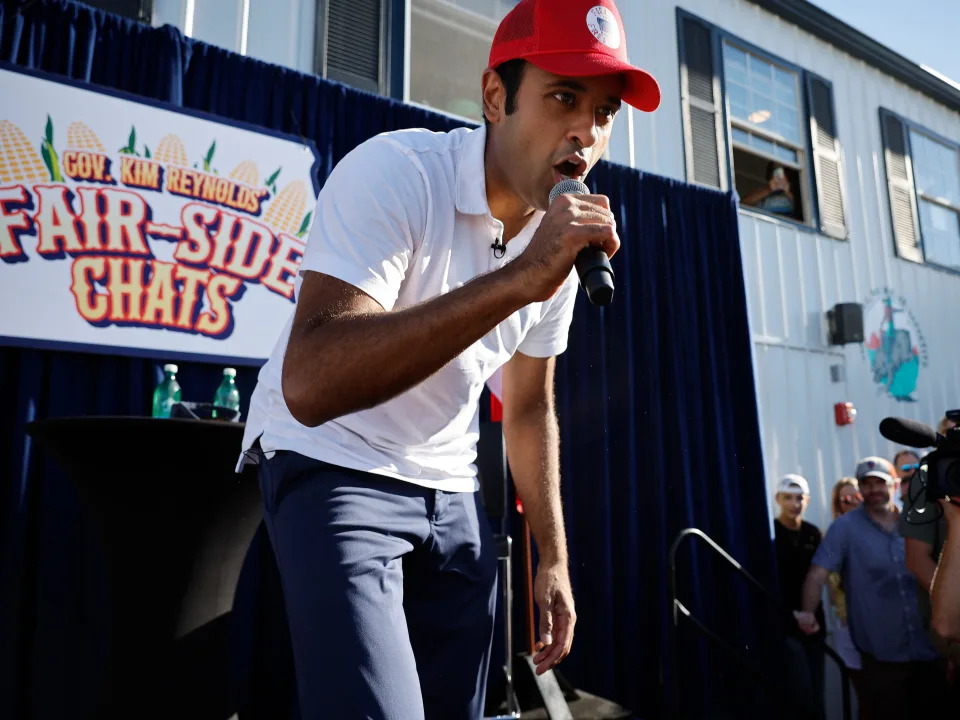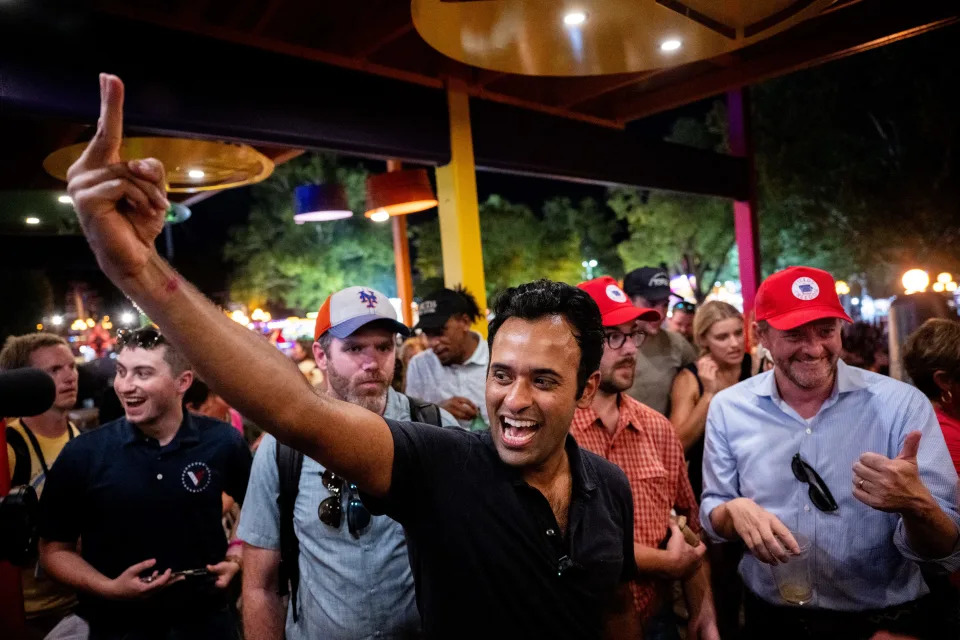Katherine Long,Jack Newsham,Meghan Morris,Jake Swearingen
Updated Fri, September 15, 2023

Chelsea Jia Feng
Vivek Ramaswamy got rich in finance and pharma before declaring war on "wokeness."
Former staff say he could be finicky and paranoid, and treat staff more like servants than workers.
Rooms had to be set to 64 degrees or below, with three Army Rangers tasked with keeping him cool.
Inside Vivek Ramaswamy's intense, high-maintenance, and highly air-conditioned empire
Biotech executive-turned-presidential candidate Vivek Ramaswamy, 38, has pitched himself to voters as a truth-teller, an ace debater, and someone who can "handle the heat."
And if the Republican were to actually nab the GOP nomination, things could get pretty warm: Ramaswamy has ticked off a litany of extreme, attention-grabbing policies that would radically shake up the nation.
He wants to invade Mexico to attack drug cartels; fire 75% of federal employees; scrap the majority of federal regulation; and abolish the Department of Education, the FBI, and the Nuclear Regulatory Commission. He's also proposed gutting the Federal Reserve; increasing reliance on fossil fuels; and pegging the dollar to gold, silver, and agricultural commodities.
The bombast has made a fan out of Donald Trump, who sits atop the Republican field and has called Ramaswamy a "very, very, very intelligent person." While Ramaswamy broke away from most of Trump's other primary challengers in the wake of a feisty debate performance in August, he is still a long shot to become the Republican nominee.
With single-digit polling figures, Ramaswamy is battling former vice president Mike Pence and former diplomat Nikki Haley for third place behind Florida governor Ron DeSantis. The much-indicted Trump is far away in the lead, according to national polling averages from FiveThirtyEight, with roughly half of registered Republicans saying they'd vote for him.
The debate introduced Ramaswamy to voters as a confident, charismatic, brash, and meme-able entrepreneur who thrives on conflict and won't back down. But seven people who worked with Ramaswamy at Roivant Sciences and Strive Asset Management, two companies he founded, told Insider that the real Vivek's self-assuredness comes with an entitled edge in private.
Behind closed doors, some of these former employees said he can be a neurotic, mercurial, and paranoid leader. He takes pains on the campaign trail to come across as salt of the earth. But a person who worked closely with Ramaswamy said, "He thinks people are put on this earth to serve him."
Ramaswamy has cast himself as the child of penniless immigrants who worked hard and scrapped harder to make it in business. But while his parents may have come from humble beginnings, Ramaswamy was raised in affluence. His father worked as an engineer and patent attorney at General Electric, and his mother worked as a psychiatrist in private practice.
Ramaswamy was the valedictorian of his prestigious private boys' school. In 2011, he received a fellowship from a foundation started by George Soros' brother to attend Yale Law School, a move he later defended in the conservative media because he "didn't have the money." But he was also working at a hedge fund at the same time, earning nearly $500,000 the year he applied for the fellowship and $2.2 million the next year, his tax returns show.
Some aspects of his management style are quirky: he'd order Taco Bell for the office on his birthday, according to former employees. But he's also been known to demand white-glove service from staffers, these people said, insisting that they follow an often bizarre laundry-list of rules and procedures to suit his every need.
Chief among them: A relentless fixation on temperature. Not only can Ramaswamy not stand the heat, these people said — he dictated that the office thermostats at Roivant and Strive had to be set to 64 degrees or below. The workspaces were so frigid, former employees told Insider, that coworkers resorted to using space heaters at their desks and wearing their Roivant-branded Patagonia fleeces to ward off the chill.
"Yes, Vivek likes it chilly," campaign spokesperson Tricia McLaughlin confirmed.
When he traveled, he'd insist on booking backup flights, and backups to the backups, and a handful of backup hotel rooms, a former employee said, describing him as obsessive about ensuring his travel went smoothly. (On the campaign trail, Ramaswamy makes duplicative travel arrangements out of "utmost respect" for the "time and effort" of primary voters who come to his events, McLaughlin said.)
When he ordered takeout for lunch, he had his assistant plate it and serve it with a napkin before he ate, one person said. Another former employee said he asked that cottage cheese be waiting on his desk every morning.
"Curious you find this newsworthy," McLaughlin said, adding that on the campaign trail, "we eat takeout every day," and that Ramaswamy serves himself and others. To say he forced subordinates to serve him food is "false," she said.
Ramaswamy was so concerned about his safety — long before he began running for president -— that he hired a former Army Ranger as a personal security guard. The former Ranger would regularly sweep the Strive offices for security threats, a former employee said. (McLaughlin said the security is necessary because Ramaswamy and his family have received death threats.) At one point, his presidential campaign employed three former Army Rangers, including Ramaswamy's current body man, according to financial disclosures.
The Rangers were also responsible for rushing ahead of him to his hotel room when he traveled to cool down the room and ensure it was a "sufficient temperature" before he entered.
Ramaswamy's campaign disputed the characterization of him as entitled and unusually demanding. "Vivek applies the same standards to himself as to those around him," McLaughlin said, saying he works around 18 hours a day "on average" and calling him "unusually respectful" in light of his relatively rapid rise to immense wealth: Forbes estimates his net worth at around $950 million.
"Vivek doesn't believe that people are put on this earth to serve him, but that they are supposed to serve whatever mission they've signed up for," she added
.
Vivek Ramaswamy at a Republican primary debate.
An intense leader of fast-growing companies
Ramaswamy's colleagues and business partners described him as intense, smart, energetic, and the consummate salesman. He worked at the hedge fund QVT after graduating from Harvard and attended Yale while still with the fund.
He founded the pharmaceutical company Roivant at age 28, despite having limited experience in drug development, on the principle that not every drug that major pharma companies abandoned was necessarily a bust.
People who worked there said he fostered an environment more akin to a fast-moving tech startup than a pharmaceutical company. He encouraged employees to second-guess the decisions of larger companies in the industry, and gave employees equity stakes in the drug-development subsidiaries – or "Vants" – that Roivant incubated.
Ramaswamy is "masterful" at raising money, said a former Vant executive, who asked not to be named discussing his former boss. Roivant attracted investors including Masayoshi Son's SoftBank Vision Fund, Peter Thiel's Founders Fund, and the hedge fund Viking Global Investors. Ramaswamy "deeply understands the content of what he is selling and that he is very forthright about the risks and opportunities," McLaughlin said, characterizing him as "far more detail-oriented than ordinary CEOs."
Ramaswamy's latest venture, the anti-woke asset management company Strive, was kickstarted last year with $20 million from investors including Thiel, JD Vance, and Bill Ackman. Strive passed $1 billion in assets under management this month.
Former Roivant employees said Ramaswamy worked hard and expected the same of others. When a colleague asked about cutting out early on "summer Fridays" at a town hall meeting, Ramaswamy ridiculed the idea, two of them said.
"He lost his cool completely and went off on a rant about summer Fridays and how dare anyone ask about that," one of the former employees said.
McLaughlin called the employee's recollection "inaccurate," adding that Ramaswamy "has never once raised his voice or used bad language with employees."
Roivant has brought several drugs from development into the market, including a skin cream that could eventually generate more than $1 billion a year in sales, the threshold for a blockbuster treatment, according to an estimate from analysts at Leerink Partners — particularly if FDA approval comes through for broader applications. But even when his ventures failed, Ramaswamy managed to benefit personally.
Roivant's first big bet was on an Alzheimer's drug it bought from GlaxoSmithKline for an up-front cost of just $5 million. Ramaswamy spun the drug's promise into a new company, Axovant, that was valued at $2.2 billion shortly after its IPO. He drummed up interest in the company on CNBC's Mad Money and in business magazines. Forbes, which had named him to its 30 Under 30 list while he was still at QVT, profiled him twice.
Two years after the IPO, poor results on clinical studies for the Alzheimer's drug sent Axovant's share price plunging 95%, hurting those who'd bought Ramaswamy's pitch that he could upend the pharmaceutical industry by liberating wonder drugs from the greedy claws of Big Pharma. Ramaswamy laid off 67 people, trade publication FierceBiotech reported.
He told employees "the layoffs came from a place of strength and this is the A-team," one former employee recalled, and then tossed in another sports metaphor about there being "blood on the court." Ramaswamy does not recall using those words, McLaughlin said, but does not dispute the employee's recollection, adding that he is a "strong believer in cutting underperformers and retaining only the top talent — as he expects to do in the federal government."
But despite the Axovant bloodbath, Ramaswamy's 2015 tax returns show $37 million in capital gains. (McLaughlin said it was from selling "a tiny portion" of Roivant stock.) He made $18.8 million more from 2016 to 2019.
Ramaswamy had a second big payday in 2020, after Roivant struck a $3 billion deal with Japan's Sumitomo Pharma Co. Ltd. Ramaswamy reported $174 million in capital gains the year of the deal.
"Roivant did better under Ramaswamy than most similarly-sized drug companies," said Erik Gordon, a University of Michigan business school professor. "It could have been his innovative approach to managing drug development or luck despite his missteps with the FDA, and probably was a little of each."
Ramaswamy was "visionary," a third former Roivant employee said. Apart from his prodigious ability to win over investors, he chose a strong successor before stepping down as Roivant's CEO in 2021 "to take the company into the next phase of professionalization," this person said.
"He deserves credit for all those things."
Vivek Ramaswamy rapping Eminem's "Lose Yourself" at the Iowa State Fair.
Getty Images
Hype man in chief
But there's a flip side to Ramaswamy's ease at schmoozing investors. His critics see him as a hype man, wielding a megawatt smile and "debate me" rapid-fire eloquence to pump the value of the two companies he founded — and now his presidential prospects.
At Roivant, Ramaswamy kept his politics largely to himself, former employees said. But some felt his political ambitions were obvious. While he worked five days a week in New York when he wasn't traveling, he maintained a residence in Ohio. Some employees thought he would one day run for US Senate there, as his friend and Yale Law classmate Vance ended up doing.
In 2020, he gained a toehold in the conservative movement via the Wall Street Journal's op-ed page, where he emerged as a crusader against the environmental, social, and governance (ESG) investing movement, which seeks to convince investors to put their money in environmentally and socially conscious enterprises. He left Roivant and founded Strive a year later.
Building on Ramaswamy's tirades against ESG, Strive promises to advocate loudly against diversity and climate initiatives at the companies where it invests its clients' money.
The firm also gives investors the option to put their money into exchange-traded funds (ETF) made up of explicitly anti-woke companies, such as in the fossil fuels and military manufacturing sectors. (Strive's biggest ETF offers investors broad market exposure to the largest US companies.)
The firm has ridden a backlash to the ESG movement from pension fund managers in red states, according to reporting from The Lever and the nonprofit Documented. The Texas Employees Retirement Fund has invested $100 million in a Strive ETF that omits Chinese companies, while Indiana signed a $150,000 agreement with Strive to review the state retirement system's investment policies. Strive has also pitched Republican political institutions on a Strive 401(k), a former employee said.
McLaughlin said that in pitching state pension funds, Strive has behaved no differently than any asset manager. "The real problem," she added, is that major asset managers like BlackRock, State Street, and Vanguard "have captured the state pension fund system in a way that blocks out new entrants and competitors."
Meanwhile, two former employees, John Phillips and Joyce Rosely, have alleged in separate lawsuits that Ramaswamy asked them to violate securities laws by using unapproved marketing materials and pitching investors on Strive's ETFs before they could legally do so.
In his suit, Phillips said Ramaswamy gave the impression he'd stay involved with the business even though he was preparing to run for president. He also claimed that Strive, Ramaswamy, and co-founder Anson Frericks misled him about commitments they'd gotten from investors, the number of ETFs he'd have to sell, and their ability to hire more employees to support his work.
Rosely also said the company's HR head and Frericks did nothing to investigate allegations that another executive was harassing a younger woman employee.
"When Ms. Rosely brought up the issue with defendant Frericks, his only response was that it was none of his business," her lawsuit said. Strive has disputed the allegations in both lawsuits and said it follows the law. The company said Phillips was fired for underperformance and Rosely failed to meet her sales goals.
Strive doesn't appear to have any special sauce except its anti-ESG stance, two experts who reviewed the firm's offerings told Insider.
"They're basically making exact replicas of the BlackRock funds, but they're just saying, 'Trust us to vote just for profits and for the company to be excellent,'" said Bloomberg Intelligence analyst Eric Balchunas.
Strive said its management fees are similar to those of its competitors. But it charges slightly higher fees than BlackRock, which Todd Rosenbluth, the head of research at ETF data company VettaFi, said should give investors pause.
Investors are "likely not eager to pay more money to get exposure to the corporate efforts of the asset manager," Rosenbluth said — something which holds true for both pro and anti-ESG funds.
Some employees resented being pigeonholed as an "anti-ESG" investment firm, according to a former Strive employee. So, to some extent, does the company itself: in a statement to Insider, a spokesperson said Strive has sought to position itself as "apolitical," with a focus on "prioritizing shareholders," not stakeholders.
Christopher Lenzo, Rosely's lawyer, was more blunt. "It seems fairly apparent that the company was established merely as a talking point for Ramaswamy's presidential campaign," he said in an email.
Strive dismissed talk that it was created as a political stunt.
"Vivek was under no obligation to give real-time updates to prospective employees of his desire to serve his country," the company said in a statement
.
Vivek Ramaswamy cheers with supporters at the Jalapeno Pete's bar at the Iowa State Fair.Brandon Bell/Getty Images
A stump speech that works as a sales pitch
Ramaswamy's run for president can appear from certain angles to be the sales pitch of a lifetime.
Ramaswamy stepped away from Strive this spring, but as he's progressed in the polls, Strive too has seen success. The firm passed $1 billion in assets under management in early September, it announced on social media, up from roughly $600 million when Ramaswamy announced his run in March, a higher level of growth than typical for a fund of Strive's size, said Rosenbluth.
"In a crowded ETF market, Strive's investment approach has gained visibility due to Vivek Ramaswamy's public persona," Rosenbluth said. (Strive's "fast growth started long before" Ramaswamy announced his campaign, McLaughlin said, noting that the fund has only existed for a year.)
Ramaswamy owns a stake in Strive worth roughly $40 million, according to disclosure forms, somewhere between 50% to 75% of the company, according to SEC documentation. "An asset manager's value typically increases in tandem with its asset base," said Rosenbluth.
In other words, as Strive's fortunes continue to rise, so do Ramaswamy's. But to some people who knew him, the notion that Ramaswamy is running for vice-president — or to juice his business prospects — is absurd.
"I think he's going to win," a former Roivant employee said. "He doesn't play for second place."



No comments:
Post a Comment